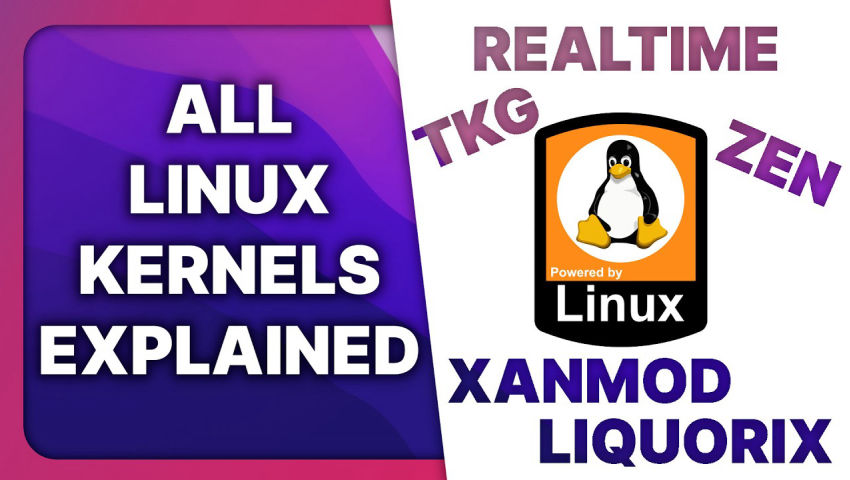- cross-posted to:
- [email protected]
1
- cross-posted to:
- [email protected]
LINUX KERNEL variants explained: Zen, Xanmod, TKG, RealTime, Liquorix...
tilvids.comYou can now subscribe to all TuxCare services online: KernelCare Online License Purchasing: https://tuxcare.com/enterprise-live-patching-services/?utm_campaign=The%20Linux%20Experiment&utm_source=youtube&utm_medium=social&utm_term=selfcheckout ELS Online License Purchasing: https://tuxcare.com/extended-lifecycle-support/?utm_campaign=The%20Linux%20Experiment&utm_source=youtube&utm_medium=social&utm_term=selfcheckout Enterprise Support for AlmaLinux Online License Purchasing: https://tuxcare.com/almalinux-enterprise-support/?utm_campaign=The%20Linux%20Experiment&utm_source=youtube&utm_medium=social&utm_term=selfcheckout Grab a brand new laptop or desktop running Linux: https://www.tuxedocomputers.com/en# 👏 SUPPORT THE CHANNEL: Get access to: a Daily Linux News show, a weekly patroncast for more personal thoughts, polls on the next topics I cover,, your name in the credits, YouTube: https://www.youtube.com/@thelinuxexp/join Patreon: https://www.patreon.com/thelinuxexperiment Or, you can donate whatever you want: https://paypal.me/thelinuxexp Liberapay: https://liberapay.com/TheLinuxExperiment/ 👕 GET TLE MERCH Support the channel AND get cool new gear: https://the-linux-experiment.creator-spring.com/ 🎙️ LINUX AND OPEN SOURCE NEWS PODCAST: Listen to the latest Linux and open source news, with more in depth coverage, and ad-free! https://podcast.thelinuxexp.com 🏆 FOLLOW ME ELSEWHERE: Website: https://thelinuxexp.com Mastodon: https://mastodon.social/web/@thelinuxEXP Pixelfed: https://pixelfed.social/TLENick PeerTube: https://tilvids.com/c/thelinuxexperiment_channel/videos Discord: https://discord.gg/mdnHftjkja #Linux #linuxkernel #linuxdesktop #linuxdistro Timecodes: 00:00 Intro 00:35 Sponsor: TuxCare 01:49 Linux Kernel 03:08 Generic Stable kernel 04:54 LTS Kernel 06:03 Libre Kernel 07:05 Hardened Kernel 08:09 Real Time / Low latency 09:48 Android kernel 11:05 Zen, Liquorix and Xanmod 13:00 TKG kernel 13:47 What should you use? 15:15 Sponsor: Tuxedo Computers 16:26 Support the channel The "official" Linux kernel, straight from Linus Torvalds and all the kernel developers, you generally see a new version every 2 to 2 and a half months. All stable versions of the Linux kernel are numbered in the usual scheme, so major number DOT minor number, but they also have really strange codenames. Some distros tend to modify these kernels with additional patches, or features that haven't been added yet, which is why you can see some kernel versions with a "-ubuntu" at the end for example. Certain kernel versions are also marked as LTS, meaning Long Term support. These are versions that will be supported for much longer, up to 6 years. The Linux kernel project recently reduced that support window to 2 years. Since both the stable and LTS kernels ship with some non free firmware, there's the Kernel Libre project, which removes all of that, to only ship software and code that is completely free, as in freedom.. Next, we have the hardened kernel. It's not an "official" project per se, it's a kernel version that certain distros ship in their repos, like Arch Linux for example. It's the stable kernel, with an additional patch set applied to it to make it more resilient security-wise. Next, we have the realtime kernel. The goal is to reduce the latency between a task being assigned to the CPU, and its execution, and it's mainly meant for industrial applications, or for audio production. This, in turn, makes it less efficient for multi tasking, and it requires a lot more manual config to be efficient, and applications need to be specifically tailored to take advantage of this lower latency. The low latency kernel variants do the same thing, but at a lesser degree: it still lets you pre-empt CPU threads like the real time kernel, but it isn't as regular as the realtime kernel. The Android kernel is focused on supporting a specific category of devices, meaning that it has optimizations for these exact things. The Zen kernel applies a few fixes and improvements meant to have the best performance and experience for linux desktop users. It's also packaged as the Liquorix kernel for Ubuntu or Debian, and other distros, although Liquorix isn't exactly like the Zen kernel. Another version is the XanMod kernel, with sort of the same optimization as the Zen kernel, and a few more on top of that, with the same goal: improving the performance of Linux systems. Finally, we have the TKG kernels, and I'm saying kernels, because TKG isn't a specific Linux kernel you can download and use, it's more like a build system that lets you choose a few specific patches and compile your own kernel with that.



I play videos on the back ground or on the side while I code. The visuals are nice sometimes to clarify something but the audio is the bulk of what I am taking in.